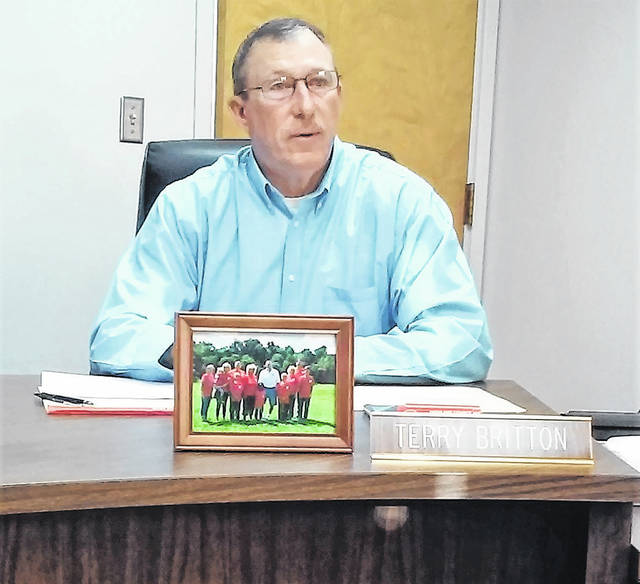
Highland County commissioners Gary Abernathy, Jeff Duncan and Terry Britton on Friday told local school officials about a proposal that would use delinquent tax funds to power the county land bank in areas beyond Rocky Fork Lake, where the land bank was originally focused.
Britton said while there were 16 blighted properties in the Rocky Fork Lake area identified for land bank purposes as part of a more than $800,000 Federal economic development grant from the Department of Justice, the land bank itself was designed to be used countywide. Britton said after the division of the DOJ that awarded the grant rejected the land bank idea, commissioners must now decide how to proceed with it.
“Unfortunately, through the process of the grant with the Department of Justice, they did not want us to have a land bank in the grant, and since the Federal government didn’t want to own property, we had to take it out,” he said.
As previously reported, the land bank allows the county to either purchase at foreclosure or acquire by deed transfer blighted or abandoned properties so it can renovate, demolish or reconstruct and sell them.
Commissioners said with the help of the land bank, blighted properties that are delinquent in property taxes can re-emerge as valuable real estate with new owners, restoring the property to the county’s tax base.
At the Friday meeting, which was attended by superintendents from several school districts and county Auditor Bill Fawley, commissioners said they may vote to allocate up to five percent of the biannual delinquent tax and assessment collection receipts, or DTAC funds, to the county land bank for unrestricted use.
“We still need a land bank,” Britton said. “We’ve got blight all over the county, and when you have properties that are not in the tax base, it is hurting all of the school systems in addition to the other entities that draw from the tax base.”
Commissioners met with Fawley to discuss the feasibility of using DTAC money as a tool for funding the land bank so it can address properties around the county. Britton said it’s important to give school officials the chance to offer their comments on the proposal, since “most of the school systems in the county get hit the hardest on this if we do a five-percent draw.”
Britton noted that “it’s not a huge amount of money, but we still felt we wanted your input on this.”
Fawley said the DTAC fund represents five percent of delinquent tax collected here.
“It is then split between the prosecutor and the treasurer to be used to go out and continue to collect additional delinquencies,” he said.
Fawley said if commissioners adopt the plan, an additional five percent would be collected, but it wouldn’t be added to the taxes of property owners. Instead, it would be withheld from funds given to the school systems and townships.
Abernathy emphasized that what is being proposed is not an additional tax. The additional funds would simply be redirected to the land bank, he said.
“We met last week with the people in Clinton County who have been doing the land bank for the last two years,” he said. “They had a similar meeting with their school superintendents to explain this, and they indicated to us the key goal in all of this is to eventually increase what will be available to collect three to five years down the road, because these properties will be turned around into taxpaying status.”
Fawley said that DTAC money would go directly to the land bank and be used only for that intended purpose.
“That money goes directly to land bank,” he said. “It doesn’t go to the county general fund, the commissioners don’t have to transfer it, in fact, they won’t even see it.”
The land bank, Fawley said, consists of two commissioners, a representative from the treasurer’s office and from the largest city in the county, and a trustee from Paint Township, since that was originally where the land bank was located.
“These five people have their own bank account which doesn’t go through the auditor’s office,” Fawley said, “and we don’t write their checks or do any payroll… it is completely outside.”
The land bank acquires property a number of ways, such as a deed in lieu of foreclosure transfer, where a delinquent owner signs over the blighted property, and lending institutions (including Fannie Mae) can transfer low-value properties, sometimes providing funds for demolition, Abernathy said. Also, Abernathy added, the Department of Housing and Urban Development transfers low-value properties to county land banks, as can private individuals and probate estates no longer wanting the burden of owning worthless or delinquent properties.
“The criteria used now to determine what delinquent properties to go after is pretty basic,” Abernathy said. “Whoever is the furthest behind in their taxes, the condition the property is in, sometimes it’s the recommendation of mayors, safety service directors, city managers and even from private citizens who want something cleaned up.”
Commissioners said some Clinton County property owners found that when nearby blighted properties went into the land bank and were renovated or rebuilt, their own property values increased dramatically.
Abernathy also said that Clinton County Commissioner Patrick Haley and Clinton County Regional Planning Commission Director Taylor Stuckert, the land bank administrator, have offered their expertise to the Highland County commissioners, offering to be “on call if we need any help.”
In requesting input and opinions from school district and county leaders, Britton said the commissioners would have a final decision on the DTAC land bank funding proposal by the end of the year.
Reach Tim Colliver at 937-402-4271.


